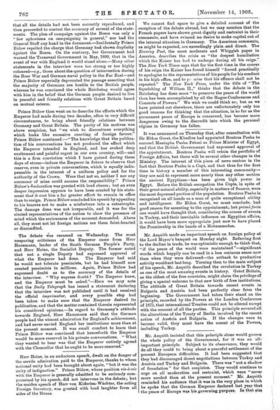We cannot find space to give a detailed account of
the reception of the debate abroad, but we may mention that the French papers have shown great dignity and restraint in their comments, and have evinced no desire to make capital out of the internal situation in Germany. The American comments, as might be expected, are exceedingly plain ,and direct. The Evening Post, the most moderate and Whiggish paper in America, describes the crisis as "the deepest humiliation which the Kaiser has had to undergo during all his reign." The New York Times says that for the first time in the course of his reign the Kaiser has found himself "forced practically to apologise to the representatives of his people for his conduct in his high office, and to pr miss that his offence shall not be repeated." The New York Press, under the title of "The Squelching of William II.," thinks that the debate in the Reichstag has done more "to preserve the peace of the world than has been accomplished by all the Hague Conferences and Concerts of Powers." We wish we could think so; but as we have pointed out elsewhere, there are unfortunately only too good reasons for thinking that the situation, in sofar as the permanent peace of Europe is concerned, has become more dangerous owing to the discredit into which the personal regime in Germany has fallen.










































 Previous page
Previous page